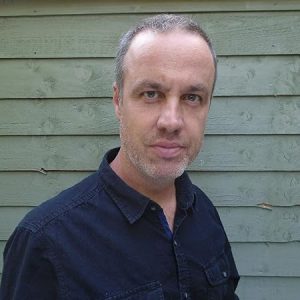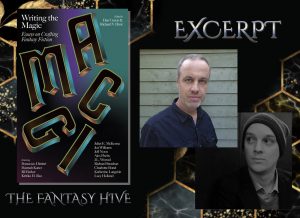WRITING THE MAGIC edited by Dan Coxon & Richard V. Hirst (EXCERPT)
“From Lord of the Rings to Game of Thrones, over the last hundred years few genres have captured the public imagination as powerfully as fantasy. Whether it’s epic quests of dwarves and elves, wizards and paladins, or the influential childhood classics of Alan Garner and C.S. Lewis, the appetite among readers for all things magical seems insatiable.
Pulling together a fellowship of some of the best writers of modern fantasy fiction, Writing the Magic invites you to step through the portal and discover what gives these tales such enduring appeal. Writers such as Jeff Noon, Hannah Kaner, RJ Barker and Jen Williams pull back the curtain on how they write fantasy, demystifying topics such as worldbuilding, sources of magic, creating authenticity, and how best to deploy your dragons.
An essential map for anyone wanting to write their own world into being, Writing the Magic explores the perilous realms of fantasy fiction – and arms novice writers with everything they need to embark on their own adventure.
Featuring essays from: Francesco Dimitri, Hannah Kaner, RJ Barker, Kritika H. Rao, Juliet E. McKenna, Jen Williams, Jeff Noon, Alex Pheby, J.L. Worrad, Richard Strachan, Charlotte Bond Katherine Langrish and Lucy Holland.”
Writing the Magic is published on 18th September by Dead Ink Books
You Do Not Need to Know How to Write a Book (Or How to Embrace Ignorance and Run with It) (excerpt)
by RJ Barker
When it comes to writing books, I have no idea what I’m doing and once upon a time I played bass guitar. Those may seem like two decidedly unrelated clauses to you, but I promise you: as a sentence, it works. Or it will work by the time we get to the end of this, even though, right at this second, I am not sure quite how; just like I’m never sure how to write a book when I sit down to do it or how a book is going to play out until it has played out.
Don’t tell anyone, though. This is just between me and you.
At the end of the book it all makes sense. It’s all so obvious and I can clearly see exactly where I was going and what I was tilting at.
Of course it was about that.
Knew it from the start.
I’m a professional author and we’re very clever like that.
I think there are experiences that are universal to writers. We talk a lot about not knowing what we’re doing, imposter syndrome, fear of the page, feeling like we are simply not good enough to write this thing. It’s the curse of any artistic endeavour to never know if it’s good enough. There is no definitive right or wrong. What one person loves with a rare and burning passion another may hate with its dark and seething twin. We are people who create something from nothing, and if you are at all familiar with physics, that’s impossible. And yet we do it.
So if something goes against the laws of physics then that’s magic, right?
But, like all good magic, it comes with a price. You can’t just go around making stuff from nothing, can you? No, of course not. And that lack of definition, the inability to know, is part of the price.
What one person loves with a rare and burning passion another may hate with its dark and seething twin
I’m not going to lie: writing is great, but I’ve never felt a rush like going on stage with a band in front of a crowd. The noise, the movement, the lights. There’s very little that can touch that. At the same time, I have never felt as deeply wrong as I did when on stage with a band, I have never felt so powerfully and obviously out of place.
Art is complicated, I guess. But remember this bit for later, we’ll circle back to it.
Looking back, I know why I chased music (even if we remove the adolescent thrill of big hair and make-up being something forbidden and rebellious). It’s because I saw myself on those stages: skinny boys who looked like girls and people who hadn’t been to university. It didn’t matter. The punk spirit and all that; you didn’t have to be clever or to have passed your exams to do it. So, for a kid who was desperate to create something, music made sense because, even though I loved books and was constantly reading, the truth of it as far as I knew was working-class kids from the suburbs of industrial Yorkshire towns didn’t become writers. So yeah, becoming a rock star was a long shot, but writing and publishing a book?
I don’t think that’s happening, sonny Jim.
When you read this, if you read this, it will be nicely edited and it will flow and there’ll probably be a theme and it will neatly tie up at the end. Writer magic, lies and more lies. If you saw this now, you would find paragraphs. Many paragraphs, and each one an unconnected thought that I am placing on the dreaded empty page while I search for whatever it is I am actually intending to say through the alchemy of the keyboard.
And it is alchemy, for me anyway.
Text to speech? No.
Handwriting? Never.
It is the act of typing that kicks into gear whatever it is in my head that makes words. I don’t really understand it. I am often terrified of examining how or why it works in case what I end up doing is performing an autopsy on my own golden goose. What use is it to me if becoming aware of my artistic process ends with me poking at a corpse that will no longer squawk out anything useful.
Writer magic, lies and more lies.
Anyway, the bass guitar. I practised on that guitar. I made my fingers bleed playing it in a vain attempt to keep up with the people I was in bands with. The type of people who could hear a song once and play it right back to you, or tune an instrument while holding a conversation. For some people their instrument is a part of them, and when you are around those people you can feel it. Or I could feel it, and I knew I didn’t have it.
You see, a bass player can wing it: hit the root note, stay on tempo, and you will be alright. I could actually do that. But at the same time that never felt creative, it felt like the least I could be doing, so I was always pushing, always working at the edges of my – well, talent is the wrong word, because I worked at it. Ability? Let’s stick with that. I forced it and I still was barely able to keep up with those who just got it. The truth of it is, every time I picked up that instrument it felt uncomfortable in my hands, alien. It was heavy, the frets and the strings never just spoke to me the way they did to the people I played with.
But, and this is the weirdest part of it – I knew what I was doing. Or I knew what I should be doing. I learned the theory, what notes went where and how to click in with the drummer and provide counterpoint to the guitar and vocal. Knowing these things, well, it really just made it worse, because knowing a thing, I discovered, isn’t the same as being able to do it.
What you might discover is how much you can’t do.
I have pretty much convinced myself that no one knows how to write a book. (I suppose that is either a brave or a foolish thing to say in a book of essays about writing.) But yes, no one actually knows. I mean, we can write books about writing books, we can discuss character arcs or immerse ourselves in the hero’s journey. We can world-build and we can plan and we can make charts, but every single one of those things is done for one purpose and one purpose only, and that is to give the writer the confidence to sit in the chair and write.
You’ll hear lots of phrases used to describe different types of writers. Again, I remain deeply agnostic about these. Are you a planner or a gardener? Do you make a meticulous skeleton and fill it in later or do you sit and write a book and see how it turns out?
Don’t kid yourself, friend, these are both the same thing.
I sit and write a book and what I call my first draft is exactly the same process as someone who has sat and sketched out every chapter in their plan (although, admittedly, maybe it has more detail). Call me a ‘gardener’ if you want, merrily finding my way. But I would say that is me making my plan for the book. It’s definitely not readable. I have to go through it again (and again and again and again) to know what I’m writing about and then make it actually work. Conversely, if you sit and do your meticulous plan, maybe that’s just your way of gardening – a first draft to find out what you intend to do.
What does this have to do with no one knowing what they are doing? you may ask. Well, we like to give things names because that gives us a sense of control. We name our demon and that gives us power over it. But writing is not controlled, art in any form is wild and chaotic because at some point you have to sit down and make something exist that has never existed in the world before. You – you! – will create something only you can create. Set out a plan or fire it off from the hip, it makes no difference. At some point, you have to decide to conjure something from nothing, and no amount of anything will change the sheer audacity of that act. You will create people and places never seen before, and these people and places will feel real, and people you have never met and will never know will care about these people that do not exist.
But writing is not controlled, art in any form is wild and chaotic
Put like that it always sounds like a madness, and maybe it is. Ask a writer ‘where do you get your ideas from’ and maybe they’ll pretend it’s a bad question. It’s not, it’s a brilliant question. It’s just a very hard one, because where do they come from? Where? Pointing at influences, at key moments that you can say ‘oh, that came from that’, is one thing. But entire novels? They are conjured from the ether, they are distilled from the alembic of life experience and imagination, and I am yet to meet a writer who can actually explain that moment of creation.
Because nobody really knows how to write a book.
 RJ Barker is a critically acclaimed and award-winning author of fantasy fiction. He won the 2020 British Fantasy Society (BFS) Robert Holdstock award for Best Novel for his fourth novel, The Bone Ships.
RJ Barker is a critically acclaimed and award-winning author of fantasy fiction. He won the 2020 British Fantasy Society (BFS) Robert Holdstock award for Best Novel for his fourth novel, The Bone Ships.
His debut trilogy The Wounded Kingdom (Age of Assassins, Blood of Assassins and King of Assassins) was nominated for the David Gemmel Award, the Kitschie Golden Tentacle, The Compton Crook and the BFS Best Debut and Best Novel awards. It was called ‘Thoroughly entertaining and constantly impressive’ by the Fantasy Hive, ‘One of the best fantasy series you will ever read’ by the BFS, and ‘A singular sensational new voice in epic fantasy’ by Kings of the Wyld author Nicholas Eames.
He followed this with the award-winning Tide Child Trilogy: The Bone Ships, Call of the Bone Ships and The Bone Ships Wake. These books have been hailed as “One of the most interesting and original fantasy worlds I’ve seen in years” by Adrian Tchaikovsky, and “Brilliant” by Robin Hobb, alongside rave reviews in Starburst, SFX, and a starred review in Bookslist: ‘A unique and memorable world – harsh and brutal and full of fully realized, powerful female characters. Barker has managed to craft a story inspired by Moby Dick, Game of Thrones, and pirate lore, and readers will be drawn in and fascinated.’
RJ lives in Leeds with his wife, son and a collection of questionable taxidermy, odd art, scary music and more books than they have room for. He grew up reading whatever he could get his hands on, and has always been ‘that one with the book in his pocket’. Having played in rock bands before deciding he was a rubbish musician, RJ returned to his first love, fiction.
Writing the Magic is published on 18th September by Dead Ink Books
 Dan Coxon is an award-winning editor and writer based in London. He has been a finalist for the Shirley Jackson Awards and the British Fantasy Awards (six times), with Writing the Uncanny (co-edited with Richard V. Hirst) winning the British Fantasy Award for Best Non-Fiction 2022. His anthology Being Dad won a Saboteur Award in 2016.
Dan Coxon is an award-winning editor and writer based in London. He has been a finalist for the Shirley Jackson Awards and the British Fantasy Awards (six times), with Writing the Uncanny (co-edited with Richard V. Hirst) winning the British Fantasy Award for Best Non-Fiction 2022. His anthology Being Dad won a Saboteur Award in 2016.
His short stories have appeared in various anthologies and magazines, including Shakespeare Unleashed, Beyond the Veil, Fiends in the Furrows III and Great British Horror 7: Major Arcana. His latest fiction anthology – Isolation – was published by Titan Books in September 2022.
The second book in the Writing series, Writing the Future, was published in September 2023, and the third, Writing the Mystery, is forthcoming in 2024.
He runs a proofreading and editing service, working with both publishers and private clients.
 Richard V. Hirst is an award-winning writer and editor from Preston, now based in Manchester.
Richard V. Hirst is an award-winning writer and editor from Preston, now based in Manchester.
His writing has appeared in numerous publications including The Guardian, Time Out, and The Big Issue and his awards include the Manchester Fiction Prize, the British Fantasy Awards and the Saboteur Awards.
He is interested in short stories, ghost stories, stories set in winter and sad stories about lonely British people quietly having a terrible time.
He also runs a community arts centre in Manchester.

